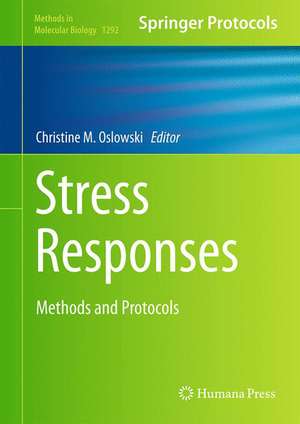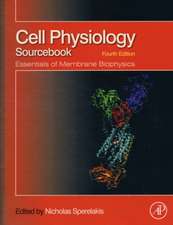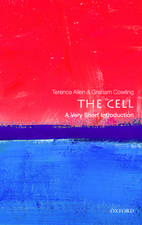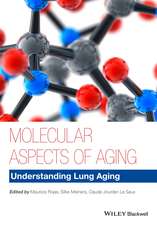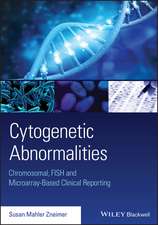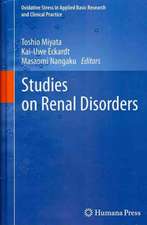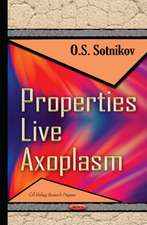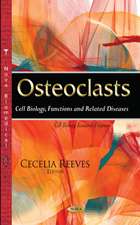Stress Responses: Methods and Protocols: Methods in Molecular Biology, cartea 1292
Editat de Christine M. Oslowskien Limba Engleză Hardback – 25 mar 2015
Authoritative and instructive, Stress Responses: Methods and Protocols seeks to aid scientists to further study multiple stress pathways and outcomes triggered by such stresses. In depth knowledge of cellular stress will eventually lead to the development of novel therapeutics to prevent or treat related diseases.
| Toate formatele și edițiile | Preț | Express |
|---|---|---|
| Paperback (1) | 528.90 lei 38-44 zile | |
| Springer – 5 oct 2016 | 528.90 lei 38-44 zile | |
| Hardback (1) | 649.39 lei 43-57 zile | |
| Springer – 25 mar 2015 | 649.39 lei 43-57 zile |
Din seria Methods in Molecular Biology
- 9%
 Preț: 791.63 lei
Preț: 791.63 lei - 23%
 Preț: 598.58 lei
Preț: 598.58 lei - 20%
 Preț: 882.98 lei
Preț: 882.98 lei -
 Preț: 252.05 lei
Preț: 252.05 lei - 5%
 Preț: 802.70 lei
Preț: 802.70 lei - 5%
 Preț: 729.61 lei
Preț: 729.61 lei - 5%
 Preț: 731.43 lei
Preț: 731.43 lei - 5%
 Preț: 741.30 lei
Preț: 741.30 lei - 5%
 Preț: 747.16 lei
Preț: 747.16 lei - 15%
 Preț: 663.45 lei
Preț: 663.45 lei - 18%
 Preț: 1025.34 lei
Preț: 1025.34 lei - 5%
 Preț: 734.57 lei
Preț: 734.57 lei - 18%
 Preț: 914.20 lei
Preț: 914.20 lei - 15%
 Preț: 664.61 lei
Preț: 664.61 lei - 15%
 Preț: 654.12 lei
Preț: 654.12 lei - 18%
 Preț: 1414.74 lei
Preț: 1414.74 lei - 5%
 Preț: 742.60 lei
Preț: 742.60 lei - 20%
 Preț: 821.65 lei
Preț: 821.65 lei - 18%
 Preț: 972.30 lei
Preț: 972.30 lei - 15%
 Preț: 660.49 lei
Preț: 660.49 lei - 5%
 Preț: 738.41 lei
Preț: 738.41 lei - 18%
 Preț: 984.92 lei
Preț: 984.92 lei - 5%
 Preț: 733.29 lei
Preț: 733.29 lei -
 Preț: 392.60 lei
Preț: 392.60 lei - 5%
 Preț: 746.26 lei
Preț: 746.26 lei - 18%
 Preț: 962.66 lei
Preț: 962.66 lei - 23%
 Preț: 860.22 lei
Preț: 860.22 lei - 15%
 Preț: 652.64 lei
Preț: 652.64 lei - 5%
 Preț: 1055.50 lei
Preț: 1055.50 lei - 23%
 Preț: 883.87 lei
Preț: 883.87 lei - 19%
 Preț: 491.89 lei
Preț: 491.89 lei - 5%
 Preț: 1038.86 lei
Preț: 1038.86 lei - 5%
 Preț: 524.16 lei
Preț: 524.16 lei - 18%
 Preț: 2122.34 lei
Preț: 2122.34 lei - 5%
 Preț: 1299.23 lei
Preț: 1299.23 lei - 5%
 Preț: 1339.12 lei
Preț: 1339.12 lei - 18%
 Preț: 1390.26 lei
Preț: 1390.26 lei - 18%
 Preț: 1395.63 lei
Preț: 1395.63 lei - 18%
 Preț: 1129.65 lei
Preț: 1129.65 lei - 18%
 Preț: 1408.26 lei
Preț: 1408.26 lei - 18%
 Preț: 1124.92 lei
Preț: 1124.92 lei - 18%
 Preț: 966.27 lei
Preț: 966.27 lei - 5%
 Preț: 1299.99 lei
Preț: 1299.99 lei - 5%
 Preț: 1108.51 lei
Preț: 1108.51 lei - 5%
 Preț: 983.76 lei
Preț: 983.76 lei - 5%
 Preț: 728.16 lei
Preț: 728.16 lei - 18%
 Preț: 1118.62 lei
Preț: 1118.62 lei - 18%
 Preț: 955.25 lei
Preț: 955.25 lei - 5%
 Preț: 1035.62 lei
Preț: 1035.62 lei - 18%
 Preț: 1400.35 lei
Preț: 1400.35 lei
Preț: 649.39 lei
Preț vechi: 763.99 lei
-15% Nou
Puncte Express: 974
Preț estimativ în valută:
124.28€ • 129.27$ • 102.60£
124.28€ • 129.27$ • 102.60£
Carte tipărită la comandă
Livrare economică 14-28 aprilie
Preluare comenzi: 021 569.72.76
Specificații
ISBN-13: 9781493925216
ISBN-10: 1493925210
Pagini: 246
Ilustrații: XI, 246 p. 51 illus., 28 illus. in color.
Dimensiuni: 178 x 254 x 18 mm
Greutate: 0.67 kg
Ediția:2015
Editura: Springer
Colecția Humana
Seria Methods in Molecular Biology
Locul publicării:New York, NY, United States
ISBN-10: 1493925210
Pagini: 246
Ilustrații: XI, 246 p. 51 illus., 28 illus. in color.
Dimensiuni: 178 x 254 x 18 mm
Greutate: 0.67 kg
Ediția:2015
Editura: Springer
Colecția Humana
Seria Methods in Molecular Biology
Locul publicării:New York, NY, United States
Public țintă
Professional/practitionerCuprins
Methods for Studying ER Stress and UPR Markers in Human Cells.- Assays for Induction of the Unfolded Protein Response and Selective Activation of the Three Major Pathways.- Assays to Characterize Molecular Chaperone Functions in vitro.- Analysis of Heat Shock Factor Complex in Mammalian HSP70 Promoter.- Immunofluorescence-Based Methods to Monitor DNA End Resection.- Visualizing the Spatiotemporal Dynamics of DNA Damage in Budding Yeast.- Detecting Reactive Oxygen Species by Immunohistochemistry.- Investigating Inflammasome Activation Under Conditions of Cellular Stress and Injury.- Methods for Studying microRNA Functions During Stress.- Measuring Autophagy in Stressed Cells.- Detection of Apoptosis Using Fluorescent Probes.- Measuring Death of Pancreatic Beta Cells in Response to Stress and Cytotoxic T Cells.- Adaptation of the Secretory Pathway in Cancer Through IRE1 Signaling.- Studying Nitrosative Stress in Parkinson's Disease.- Crosstalk Between ER Stress, Oxidative Stress, and Inflammation in Health and Disease.- Stress Responses During Ageing: Molecular Pathways Regulating Protein Homeostasis.- Targeting Stress Responses for Regenerative Medicine.
Notă biografică
Christine M. Oslowski, Ph.D. 21 Franklin Street, Apt 7 Somerville, MA 02145 Cell: (617) 501-6711 Email: coslowsk@bu.edu
Textul de pe ultima copertă
This volume focuses on detecting different cellular stresses, measuring pathological consequences within the cell, and investigating the role of cellular stresses in select diseases. In addition, this book reviews the crosstalk between different stress pathways, stress responses during ageing, and targeting stress for regenerative medicine. Written in the highly successful Methods of Molecular Biology series format, chapters include introductions to their respective topics, lists of the necessary materials and reagents, step-by-step, readily reproducible laboratory protocols, and key tips on troubleshooting and avoiding known pitfalls.
Authoritative and instructive, Stress Responses: Methods and Protocols seeks to aid scientists to further study multiple stress pathways and outcomes triggered by such stresses. In depth knowledge of cellular stress will eventually lead to the development of novel therapeutics to prevent or treat related diseases.
Authoritative and instructive, Stress Responses: Methods and Protocols seeks to aid scientists to further study multiple stress pathways and outcomes triggered by such stresses. In depth knowledge of cellular stress will eventually lead to the development of novel therapeutics to prevent or treat related diseases.
Caracteristici
Includes cutting-edge methods and protocols Provides step-by-step detail essential for reproducible results Contains key notes and implementation advice from the experts
